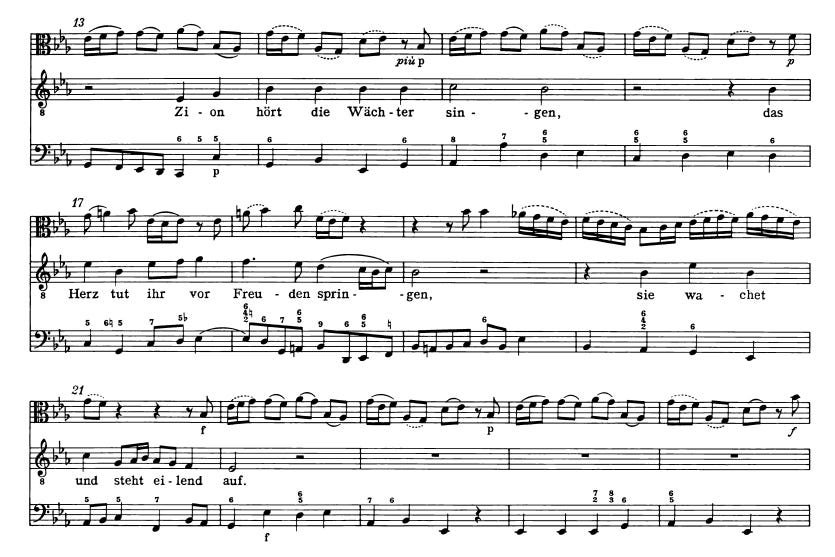February 29: Cantata BWV 140; Munchener Bach-Orchester; Karl Richter, conductor; and BWV 645 (Various artists)
Coincidence, fortune, and getting weepy on the MTA
A melody of Bach’s came unbidden into my head a few nights ago. Not wanting to lose it, I captured a whistle in a semi-tuneful voice memo.
I couldn’t quite place it. Like a dream where a long deceased loved one appears, I was happy to receive the melody, and melancholy that it was gone again. There are 200 hours of Bach’s music, how could I find eight discrete seconds of it? The melody had a feeling of a cello or lute in my mind, but also of a piano and guitar. Where was it from, deep in my past or here and now? If I’d heard it only since I started this project in January, it means I probably wouldn’t encounter it again until next year, if I choose to start back again from the top.
Feeling slightly dejected the next morning, but ever eager for new music, I opened my Year of Bach listening queue on the commuter train. On the recommendation of the conductor Masaaki Suzuki from Tyler Cowen’s podcast, I played the Cantata BWV 140 “Wachet auf, ruft uns die Stimme” (“Awake, calls the voice to us”), recorded by the Münchener Bach-Orchester in 1979 and conducted by Karl Richter. It started off nicely. In my notes for Part 3, I wrote, ‘revisit pretty duet, beautiful basso (Fischer-Dieskau)’. For Part 4, I wrote, ‘what. WHAT?! how’:
I hadn’t ever heard this Cantata before. I was bewildered and moved all at once. Then Peter Schreier rises to sing:
And I found myself wiping away tears on the Metro-North, overcome by my mysterious fortune. This melody manifested inside me from somewhere, and then I was graced by it in the world.
The song in the violins, with a beautiful countermelody in the bass, continues throughout, but the true magic comes from the complementing line for the tenor singer. The conductor Karl Richter takes an unusually slow tempo, and Schreier’s phrasing is exquisite. The three sung phrases first commence on a third beat, then a fourth beat, a the second beat. Our gentle violin melody and our singer never quite sync up. Bach shares with us the beauty of synchronicity, and attendant feelings of separateness. It’s monism and dualism, God and man.
On the third repeat, we are gently ushered into a minor mode. From the first notes of this recapitulation, Bach telegraphs the entire altered melody, and unfolds it naturally:
And brings it home back in the major key, with the vocal melody trailing off in impossible beauty.
I listened to this piece on repeat all day, grateful for its existance.
Here’s a translation of the chorale’s text, sometimes known as “Sleeper’s Awake”:
Zion hears the watchmen singing,
her heart leaps for joy within her,
she awakes and hurriedly rises.
Her beloved comes from heaven in splendor,
strong in grace, mighty in truth,
her lamp grows bright, her star ascends.
Come now, you worthy crown,
Lord Jesus, God’s son,
Hosanna!
We follow all to the joyous hall
and partake in the evening meal!
Later, in preparation for this post, I found that this movement of BWV 140 was adapted by Bach for organ as BWV 645. So even though I had not heard the song, I had heard many adaptations through the years. (It did, after all, get into my head somehow.)
Such as from the great Scottish/Spanish guitarist David Russell:
And a puckish take from Chris Thile, Edgar Meyer, and Yo-Yo Ma from their great Bach Trios 2017 disc, with Ma playing the ‘tenor’:
And this from an odd album of Bach piano transcriptions by Francesco Piemontesi that I listened to a bunch in 2021:
Here’s Bach’s original adaptation for organ in a well-shot video by the Netherlands Bach Society:
My conflicted mind was correct from the start: the melody really was cello, and lute, and guitar, and piano. But I’d never before heard the work at its pinnacle, when it was sung. What a gift it became.
You won’t spend a better five minutes today than listening to this with headphones and your eyes closed:





One of the great melodies of all time (which isn’t even Bach’s thing, but yes, he could do it all). Not usually a “big Bach” fan, but Richter nails this one with the lushness of the strings.
I first heard this Bach piece via the Swingle Singers! https://youtu.be/wLOu50pohdU?si=JRP9XQOhbx9NPwML